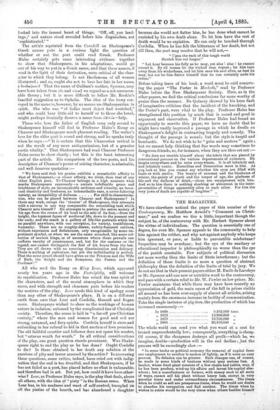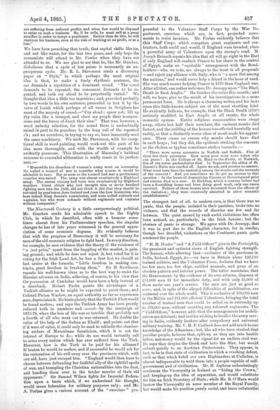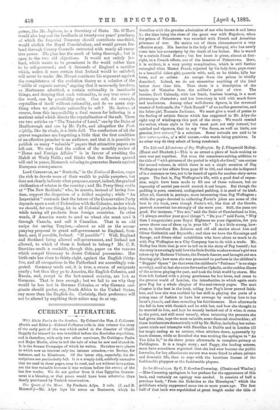THE MAGAZINES.
WE have elsewhere noticed the paper of this number of the Contemporary, Mr. Matthew Arnold's " Comment on Christmas ;" and we confess we tire a little, important though the subject be, of the controversy with Mr. Herbert Spencer about the virtue of individualism. The question is essentially one of degree, for even Mr. Spencer appeals to the community to help him against the robber, and why not against anybody who keeps him ignorant, or poor, or liable to preventible misfortune P Inspection may be overdone ; but the eye of the sanitary or educational inspector is philosophically no worse than the eye of the parish constable. Few subjects of political discussion are more worthy than the limits of State interference ; but the definition of those limits is no more a question of abstract philosophy than the definition of the limits of trial by jury. We do not see that in their present papers either M. Emile de Laveleye or Mr. Spencer add one new or nutritive word to the controversy, and pass with a certain relief to Mr. W. Fowler on low prices. Mr. Fowler maintains that while there may have been recently an appreciation of gold, the main cause of the fall in prices visible all around us has been over-supply of almost all articles, arising mainly from the enormous increase in facility of communication. Take the single instance of pig-iron, the production of which has increased enormously :—
In 1868 9,392,000 tons.
„ 1872 13,906,000 „ „ 1870 13,768,000 „ „ 1883 20,410,000 „
The whole world can send you what you want at a cost for transit nnprecedentedly low; consequently, everything is cheap. Of course, if the cheapness destroys all profit—which he, we imagine, doubts—production will in the end decline ; _bat the process will be exceedingly slow :—
" In some books on political economy the removal of capital from one employment to another is spoken of lightly, as if it were an easy process. No delusion can be greater. Such changes can, of course, be made in some kinds of business without very serious loss. A banker, whose fixed plant consists of a few chairs and tables, may, if he has been prudent, wind-up hie affairs and invest his capital elsewhere; but a manufacturer or farmer, with money sunk in all sorts of ways, cannot sell his plant without heavy loss, except in very peculiar tithes and under extraordinary circumstances. The times when he could so sell are prosperous times, when he would not desire to abandon his occupation and find another. The times when he wishes to retire would be the very times when others besides himself are suffering from reduced profits, and when few would be disgosed to enter ou such a business. So, if he sells, he must sell at a great sacrifice in order to tempt a purchaser. Rather than do this, he will continue his business, even at the risk of working at no profit, or at a loss."
We have been preaching that truth, that capital shifts like ice, and not like water, for the last two years, and only hope the economists will attend to Mr. Fowler when they have not attended to us. We are glad to see that he, like Mr. Goschen, disbelieves that a cycle of low prices is necessarily an *un prosperous cycle. Mr. R. L. Stevenson sends a discerning paper on " Style," in which perhaps the moat original idea is that, to make a finely rhythmic sentence, the ear demands a repetition of a dominant sound. The vowel demands to be repeated, the consonant demands to be repeated, and both cry aloud to be perpetually varied." We thought that idea a little too ingenious ; and, provoked probably by two words in his own sentence, proceeded to test it. by the verse of Isaiah which perhaps of all verses in Scripture has most of the majesty of sound,—" Cry aloud ; spare not; lift up thy voice like a trumpet, and show my people their trangres sions and the house of Jacob their sins." That was, however, a most unlucky selection, for the sound there is undoubtedly raised in part to its grandeur by the long roll of the repeated r's ; and we ourselves, in trying to say so, have innocently used the same machinery. We wish Mr. Stevenson, with his exceptional skill in word-painting, would work-out this part of his idea more thoroughly, and with the wealth of example be evidently possesses. This illustration of Macaulay's habitual recourse to concealed alliteration is really comic in its perfect ness :
"Meanwhile the disorders of Kannon's Kamp went on iuKreasing. lie ;called a Kouncil of war to Konsider what Kourse it would be advisable to taKe. But as soon as the xouncil had met a preliminary Kuestion was raised. The army was almost eKsKlusively a Highland army. The recent viKtory had been won eKsKlasively by Highland warriors. Great chiefs who had brought aim or seven hundred fighting men into the field, did not think it fair that they should be outvoted by gentlemen from Ireland and from the Low Kountries, who bore indeed King James's Kommission, and were Kalled Kolonels and Kaptains, but who were Kolonels without regiments and Kaptains without Kompanies."
The Nineteenth. Century is a little overpoweringly political. Mr. Goschen sends his admirable speech to . the Eighty Club, in which he described, often with a humour some times absent from his Parliamentary speeches, the singular changes he has of late years witnessed in the general appreciation of some economic dogmas. He evidently believes that with the progress of Democracy it will be necessary for men of the old economic religion to fight hard. In every direction, for example, he sees evidence that the theory of the existence of "a just price," apart from the haggling of the market, is gain ing ground; and while he does not reject it, but voted for it in voting for the Irish Land Act, he has a fear lest we should at last arrive at the formula, " Little freedom in making contracts, great freedom in. breaking. them." Sir H. Rawlinson repeats his well-known ideas as to the best way to resist the Russian advance on India, adhering, of course, to his view that the possession of Candahar would have been a help instead of a drawback. Hobart Pasha paints the advantages of a Turkish alliance as he might be expected to paint them ; and Colonel Picton Warlow, an equal authority as far as experience goes, depreciates it. He hints plainly that the Turkish Fleet would be found useless ; and says the Turkish Army has beedgreatly reduced both in numbers and morale -by the campaign of 1875.78, when the lois of life was so terrible that probably not a fourth of all who went out to war returned. He doubts the value of the help of the Sultan as Khalif ; and points out that if it were of value, it could only be used to rekindle the slumbering embers of Mussulman fanaticism, which it is not the interest of Europe to do ; while its use would instantly call to arms every nation which has ever suffered from the Turk.
Moreover, how is the Turk to be paid for his alliance ? If beaten he would be useless, and if successful he would ask for
the restoration of his evil sway over the provinces which, with our aid, have just escaped him. "England would then have to choose between defrauding her faithful ally of the rightful spoils of war, and trampling the Christian nationalities into the dust, and handing them over . to the tender mercies of their old oppressors." Sir Samuel Wilson fights for Imperial Federation upon a basis which, if we understand his thought, would mean federation for military purposes only ; and Mr. A. Forbes gives a curious account of the " exercises " pro
pounded to the Volunteer Staff Corps by the War Department, exercises which are, in fact, projected movements to resist invasion. Mr. Forbes evidently believes that this Staff Corps, which comprises great engineers and contractors, both could and would, if England were invaded, place
a powerful army of Volunteers upon the enemy's road. M. Joseph Reinach repeats his idea that all will go right in the East
if only England will readmit France to her share in the control of Egypt, make an " equitable " arrangement with the Bondholders—who, we note, are always to the front in all proposals —and reject any alliance with Italy, who is " a mere flirt among the nations," and would never help a friend in the hour of need. She was much nearer helping France in 1870 than England was. After all that, one rather welcomes Dr. Jessopp upon " The Black Death in East Anglia." He finishes the series this month ; and will, we hope, give us the result of his investigations in a more permanent form. He is always a charming writer, and his facts upon this little-known subject are of the most startling kind.
He evidently believes, for example, that the Black Death (1349) seriously modified, in East Anglia at all events, the whole
monastic system. Entire religious communities were swept away, others lost half their members, the eminent monks died fastest, and the refilling of the houses was effected hurriedly and rashly, so that a distinctly worse class of monk made his appearante. There seems no reason why monks should have died in such heaps ; but they did, the epidemic striking the convents as the cholera or typhus sometimes strikes barracks : " There were seven nunneries in Norfolk and Suffolk. Five of them lost their prioresses. How many poor nuns were taken who can guess? In the College of St. Diary-in-the-Fields, at Norwich, five of the seven prebendaries died. In September the abbot of St. Bennet's Halm was carried off. Again we ask, and receive no answer, What must have been the mortality among the monks and the servants of the convent And yet sometimes we do get an answer to that question. • In the house of Augustinian Canons at Heveringland prior and canons died to a man. At Hickling, which a century before had been a flourishing house and been doing good work, only one canon survived. Neither of these houses ever recovered from the effects of the visitation ; they were eventually absorbed in other monastic establishments."
The strangest fact of all, to modern ears, is that there was no panic, that the people, isolated in their parishes, broke into no violence, and that the records of disorder are few and far between. The quiet caused by such awful visitations has often been noticed, as, particularly, in the Irish famine ; but the absence of panic is strange. We agree with Dr. Jessopp, that it was in part due to the English character, for in similar, though less dreadful, visitations on the Continent, panic quite mastered the people.
"H. M. Hozier " and " A Field Officer" give in the Fortnightly the pessimist and optimist views of English fighting strength. The former, while allowing that—exclusive of the garrisons in India, Ireland, Egypt, &c.—we have in Britain alone 126,C00 trained soldiers, and the Volunteer Force, declares that we have too few men, too few ships, unfilled arsenals, and guns of an obsolete pattern and inferior power. The latter maintains that the Government, by the evidence of its own returns, disposes of 251,000 men fit for immediate duty, and with only 35,000 of them under one year's service. The men are just as good as ever; and, in spite of the alleged difficulties of mobilisation, are scattered over the whole world. This is exclusive of 108,000 men in the Militia and 181,000 efficient Volunteers, bringing the total number of trained men that could be relied on in extremity up to 478,000 men, without counting any coloured regiments. The " Field Officer," however, adds that the arrangements for mobilisation are deficient; and besides wishing to localise the army serving in India, evidently hankers after compulsory and universal military training. Mr. V. H. P. Caillard does not add much to our knowledge of the Albanians ; but, like all who have studied that peculiar people, believes that, split-up as they are into hostile tribes, autonomy would be the signal for an endless civil war.
He says they despise the Greek and hate the Slav, but would submit quietly to an Austrian Protectorate. They appear, in fact, to be in that state of civilisation in which a crushing defeat, such as that which befell our own Highlanders at Culloden, is almost indispensable to weld them into a people capable of self
government and of civilisation. Mr. H. Jephson unhesitatingly condemds the Viceroyalty in Ireland as " hiding the Crown," and keeping-up the idea of separation, and would substitute for him an Irish Secretary of State ; while Mr. R. O'Hara would bestow the Viceroyalty on some member of the Royal Family, but would make his position purely social, and leave substantial
poWer, like Mr. Sephson, to a Secretary of State. Mr. O'Hara would also buy-out the landlords at twenty-one years' purchase, of which the Imperial Treasury should contribute one-third, would abolish the Royal Constabulary, and would govern Ireland through County Councils entrusted with nearly all executive power. His plan has the merit of being thorough ; but is open to the two old objections. It would not satisfy Ireland, which wants to be prominent in the world rather than to be self-governed ; and it demands of England a sacrifice which, unless it were certain that Ireland would be satisfied, will never be made.Mr. Mivart continues his argument against the completeness of the evolution theory as a solution of the " riddle of organic nature," arguing that it necessarily involves, as Hartmann admitted, a certain rationality in inanimate things, and denying that such rationality, in any true sense of the word, can by possibility exist. Can salt, for example, crystallise of itself -without rationality, and do we mean any
thing when we attribute rationality to salt He derives, of course, from this impossibility a final reason for believing in a sentient mind which directs the crystallisation of the salt. There are two articles on " The Transfer of Land," one by the Duke of Marlborough and one by Mr. Fyffe, and altogether the Fortnightly, like its rivals, is a little dull. The conductors of all the graver magazines are forgetting a little that the first condition of an effective preacher is, an audience, and that it is possible to publish so many " valuable" papers that attractive papers are left out. We note that the author of the monthly review of "Home and Foreign Affairs " is in favour of awaiting the Mandi at Wady Halfa ; and thinks that the Russian quarrel will end in peace, Bismarck refusing to guarantee Russia against European consequences.
Lord Carnarvon, as " Ruricola," in the National Review, urges the rich to devote more of their wealth to public purposes, but does not clearly indicate what purposes, except,indeed, the gradual civilisation of estates in the country ; and Mr. Percy Greg scolds at " The New Radicals," who, he asserts, instead of loving freedom, support the despotism of a drilled majority ; while "An Imperialist" contends that the future of the Conservative Party depends upon a sort of Federation with the Colonies, under which we should, for one thing, let in all Colonial products duty-free, while taxing all products from foreign countries. In other words, if America wants to send us wheat she must send it through Canada, and call it Canadian. That is an odd recipe for saving Toryism,—almost as odd as the accompanying proposal to grant self-government to England, Scotland, and, if possible, Ireland. "If possible" ! Well, England and Scotland being allowed self-government, and Ireland not allowed, to which of them is Ireland to belong ? Mr. C. E. Dawkins sends a readable, though thin, paper on the reasons which compel Germany to desire Colonial possessions. Her birth-rate has risen to thirty-eight, against the English thirtyfive, and all occupations in the Fatherland are accordingly congested. Germany sends out, it is true, a swarm of emigrants yearly ; but then they go to America, the English Colonies, and Russia, and, except in the last-named country, are lost as Germans. That is true enough ; but we fail to see why they would be less lost in German Colonies, or why German emigrants should prefer, say, South Africa to the United States, any more than the English do. Certainly, their preference will not be altered by anything their rulers may do or say.




































 Previous page
Previous page